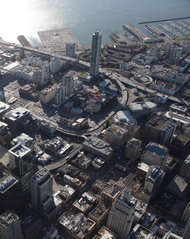 Jim Wilson/The New York Times Engineers tend to move to the Bay Area to get together with other engineers.
Jim Wilson/The New York Times Engineers tend to move to the Bay Area to get together with other engineers.
In San Francisco, a bad habit can be the spark that leads to starting a company.
Mike Belshe and Bill Lee were continually running late for meetings and texting each other: “I’ll be there in 5 mins!” So they created Twist, a 10-person start-up in the city’s South of Market neighborhood. The company’s first product is a smartphone app that helps you tell someone you’re late by showing your location on a map. Investors liked the idea enough to give Twist $6 million in venture financing last year.
“We thought there had to be something better than sending a text message,” Mr. Belshe said in a phone interview. “We were trying to tackle that problem of meeting up and making it easier.”
Is Twist a great idea, or are Mr. Belshe and Mr. Lee falling into a local propensity for creating a product for technophile friends rather than the public?
Sometimes, Hollywood screenwriters create scripts filled with inside jokes that only people in Hollywood could appreciate. Sometimes, New York media writers write about other New York media writers. And sometimes, tech entrepreneurs in San Francisco and Silicon Valley to the south create companies best appreciated by other people who live and breathe technology.
Twist is hardly the only start-up whose target audience does not seem to extend far from San Francisco Bay. Among many, there’s BlackJet, which offers “affordable private jet” solutions for people in the area. And there’s Swig, which connects people with local liquor stores that provide home deliveries.
“One of the most important lessons I’ve learned is that we are guilty in the Valley of designing things for ourselves, and we are not the target market,” said Andy Smith, who is the co-author of “The Dragonfly Effect,” a book about marketing, technology and entrepreneurship.
Engineers tend to move to the Bay Area because of the opportunity to get together with other engineers and, just maybe, create a great company, Mr. Smith said. But in a region that has the highest concentration of tech workers in the United States, according to the Bureau of Labor Statistics, the bars, restaurants and other haunts of entrepreneurs can be an echo chamber. The result can be a focus on solutions for mundane problems.
“Some of the start-ups being created are designed for people who have rung the cash register already,” Mr. Smith said. “They are not necessarily bad ideas but they are not the ideas the world needs more.”
As George Packer wrote in The New Yorker last week: “Life inside Silicon Valley can be a paradise (for its winners) of opportunity and reward. Meanwhile, life outside falls further and further behind.” Mr. Packer’s critique started a new round of hand-wringing in the industry among people who worry that they are, well, thinking small.
That’s not to say there aren’t still people thinking about big markets. Elon Musk, the founder of Tesla, which sells electric cars that can cost more than $100,000, said last week at the D: All Things Digital conference in Rancho Palos Verdes, Calif., that he hoped to offer a $30,000 version of the car in the next five years. Mr. Musk is also working on SpaceX, which is already taking cargo to the International Space Station and which he hopes will one day take regular people (or at least regular rich people) into outer space.
But too often, says Jason Pontin, the editor in chief and publisher of MIT Technology Review, these start-ups are solving “fake problems that don’t actually create any value.” Mr. Pontin knows a thing or two about companies that aren’t exactly reaching for the stars. From 1996 to 2002, he was the editor of Red Herring, a magazine in San Francisco that chronicled the region’s dot-com boom and eventual collapse.
Still, some companies that start out with Silicon Valley in mind have shown they can adapt to the rest of society. Take Uber, which began in the San Francisco area as an online service meant to shuffle the affluent around in fancy town cars. As the company has expanded to other cities, it has created less expensive options for customers.
Even the founders of Twist see a future beyond informing their friends that they are five minutes late. Mr. Belshe said Twist planned to offer a version of the app that can give users the “estimated time of arrival for your packages, too.”
Just as Facebook is synonymous with relationships, and Google is synonymous with search, Mr. Belshe said he hoped Twist could be the essential company for people who want to know the estimated arrival time for any number of things.
“When you’re a start-up, it doesn’t matter if you have it all figured out,” said Mr. Belshe, who has worked for Google and previously sold a software company to Microsoft. “It matters that you have some large opportunities.” Mr. Lee, his co-founder, is also an industry veteran.
And if the company flops, that’s fine, because most start-ups do.
“One of perhaps the most compelling things about Silicon Valley is that it is a place where you can fail, and if you do, you can raise money and try again,” said Mark Leslie, a retired entrepreneur and lecturer at the Stanford Graduate School of Business. “It’s a miraculous place; the streets are lined with gold here.”
E-mail: bilton@nytimes.com
A version of this article appeared in print on 06/03/2013, on page B5 of the NewYork edition with the headline: The Echo Chamber Of Silicon Valley.
Article source: http://bits.blogs.nytimes.com/2013/06/02/disruptions-the-echo-chamber-of-silicon-valley/?partner=rss&emc=rss
Speak Your Mind
You must be logged in to post a comment.